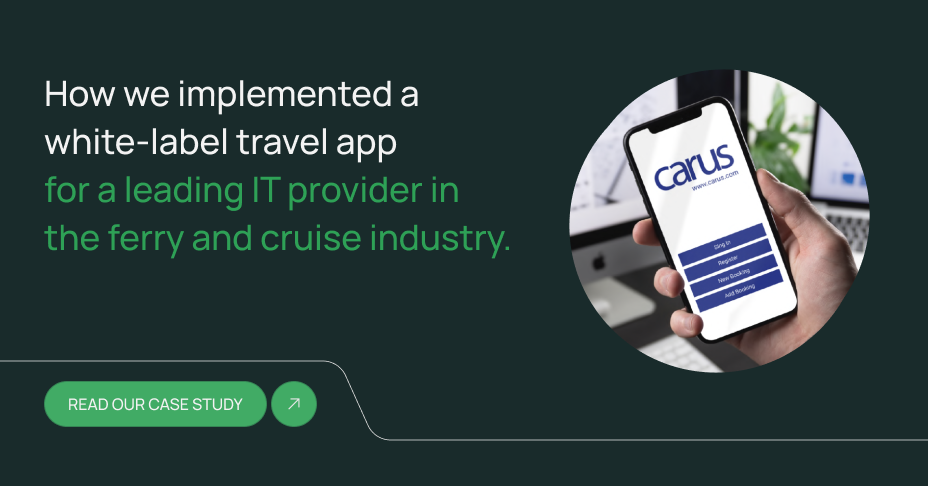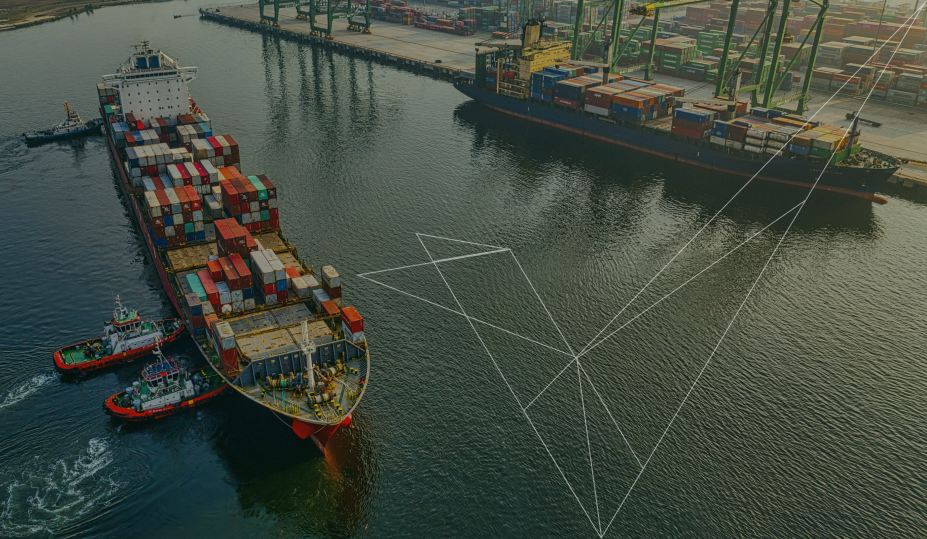
Ships are the backbone of global supply chains, transporting nearly 80% of goods worldwide. The digital transformation of the maritime industry is significantly boosting their efficiency. For instance, the marine software market is projected to reach $2.9 billion by 2026.
Many companies are switching to custom software solutions because off-the-shelf maritime digital solutions often fail to meet their specific needs. Custom solutions help them increase efficiency, productivity, and profitability.
Let’s explore how digital transformation in the maritime industry helps companies overcome challenges and improve their efficiency.
What Is Digital Transformation in the Shipping Industry?
Digital transformation in the shipping industry involves integrating advanced technologies into all aspects of maritime operations to enhance efficiency. This includes using tools like AI, data analytics, IoT, blockchain, and automation. As a result, companies can:
- Streamline operations;
- Optimize routes;
- Improve communication;
- Reduce costs and increase profitability.
Key elements of digital transformation in shipping include real-time monitoring of vessel performance, predictive maintenance to prevent equipment failures, and enhanced traceability of goods throughout the supply chain. Additionally, digital transformation improves port management and reduces transit times, allowing companies to minimize their environmental impact while optimizing fuel consumption.
Why Is Digitization Important in the Maritime Industry?
Digitalization in the maritime industry integrates multiple cutting-edge technologies to achieve:
- Optimized shipping routes;
- Real-time monitoring of vessel performance;
- Improved port operations;
- Reduced transit times;
- Reduced fuel consumption.
Maritime digital transformation is also essential for improving the communication and coordination among vessels and stakeholders, including shipping lines, port authorities, customers, and all parties involved. Real-time data is also a great addition to support decision-making and predictive maintenance, ensuring smoother and more efficient operations.
Top Benefits of Adopting Digitalization in the Maritime Industry
Electronic Documentation
Digitalization facilitates the transition from paper-based to electronic documentation, improving administrative processes and reducing errors. This shift makes handling documents like bills of lading and customs declarations easier and smoother. Electronic documentation helps meet regulatory requirements and share data with stakeholders, optimizing operations and lowering administrative costs.
Learn more about the benefits of custom logistics software.
Real-Time Tracking
Real-time tracking systems provide continuous visibility of vessel locations, cargo status, and route progress. This capability allows shipping companies to make informed decisions quickly, avoid delays and save fuel. Real-time tracking also improves customer satisfaction by providing accurate updates on shipment status, enhancing transparency and trust. It also helps manage port congestion by coordinating arrivals and departures more effectively.
Predictive Maintenance
Predictive maintenance uses data analytics and IoT sensors to monitor the condition of ship equipment continuously. By analyzing this data, potential issues can be identified and addressed before they result in malfunctions, minimizing downtime and upkeep expenses. This approach extends the lifespan of the equipment.
Data Analysis
Advanced data analysis tools enable maritime companies to examine extensive data streams from diverse sources, including vessel performance metrics, weather patterns, and market trends. This capability aids in streamlining operations, cutting costs, and uncovering novel business opportunities. It also helps comply with environmental regulations by identifying ways to enhance sustainability practices.
Electronic Navigation Systems
Electronic navigation systems, such as ECDIS, enhance vessel safety by providing accurate and current navigation information. This custom software for the maritime industry reduces the risk of human error, improves situational awareness, and enables more precise route planning. Real-time tracking and weather forecasting optimize navigation routes and ensure timely arrivals.
Enhanced Security
Enhanced security protocols keep operational and customer information safe from unauthorized access and data breaches. Digital tools also improve physical security by simplifying the monitoring and control of automated surveillance systems and access control, thereby reducing the risk of piracy and theft.
Unlocking Operational Efficiency With Custom Maritime Digital Solutions
Fleet Management
Efficient fleet management is crucial for maritime businesses. Custom software solutions enable real-time monitoring of vessels, optimizing routes, and reducing fuel consumption. Predictive maintenance algorithms can help identify potential issues before they escalate, minimizing downtime and enhancing operational reliability.
Voyage Planning
Custom software solutions provide comprehensive voyage planning capabilities, considering various factors such as weather conditions, port availability, fuel efficiency, and cargo optimization. Leveraging these solutions allows maritime companies to make informed decisions, reduce voyage costs, and ensure timely arrivals.
Crew Scheduling
Efficient crew scheduling is essential for maintaining operational continuity. Custom software solutions enable automated crew rotation, taking into account regulations, certifications, and crew preferences. This streamlines the scheduling process, reduces administrative burdens, and ensures compliance with maritime labor laws.
Maintenance and Repairs
The digital transformation of the maritime freight market includes using IoT sensors and predictive analytics to monitor ship equipment health continuously. Custom software solutions facilitate proactive maintenance planning, inventory management, and asset tracking. By streamlining these processes, maritime businesses can minimize downtime, reduce costs, and extend the lifespan of their assets.
Regulatory Compliance
The maritime industry operates within a complex web of regulations and compliance requirements. Custom software solutions help automate compliance processes, ensuring adherence to international standards and avoiding penalties. Centralizing and automating regulatory workflows streamline operations and reduce compliance risks.
Financial Management
Effective financial management is vital for sustainable growth. Custom software solutions provide robust financial modules tailored to the maritime industry, facilitating accurate budgeting, expense tracking, and revenue management. Real-time financial insights enable businesses to make data-driven decisions and optimize their financial performance.

Main Challenges to Maritime Digital Transformation
While digital transformation in the maritime industry holds immense potential, several barriers must be overcome for successful implementation.
One significant barrier is data security concerns. As the maritime industry embraces digitalization, protecting sensitive data from cyber threats becomes increasingly critical. Maritime businesses must invest in robust cybersecurity measures, including firewalls, encryption, access controls, and regular security audits to safeguard their data.
Another barrier is resistance to change. Employees accustomed to traditional manual processes may hesitate to adopt new technologies. To counter this, companies should develop change management strategies that include effective communication, comprehensive training programs, and incentives to encourage employee buy-in and foster a culture of innovation.
Additionally, ensuring a smooth transition to digital processes requires investing in comprehensive training programs to equip their workforce with the necessary skills to leverage new technologies and maximize their benefits.
By addressing these barriers and implementing a thoughtful approach, maritime businesses can navigate the digital transformation journey successfully and reap the rewards of enhanced operational efficiency and sustainable growth.
Choosing The Right Maritime Software Development Partner
To implement custom software solutions effectively, maritime businesses must choose the right software development partner.
Collaborating with a partner that specializes in the maritime industry and understands its unique requirements and complexities is crucial. Such a vendor brings industry-specific knowledge and expertise, ensuring that the software solution is tailored to the maritime business’s specific needs.
A capable partner will conduct a thorough initial assessment to understand the company’s operations, processes, and pain points deeply. This will be followed by a comprehensive requirements-gathering phase, where the partner will work closely with the business to define the software solution’s scope and functionalities. The development partner will then design and develop the solution, leveraging the latest technologies and best practices. Rigorous testing will be conducted to ensure the solution meets quality standards and performs as intended.
Additionally, a reliable software development partner will provide ongoing support and maintenance, ensuring that the software remains up-to-date, secure, and optimized for the changing needs of the maritime business. By choosing the right software development service provider, maritime companies can maximize the benefits of custom software solutions and confidently navigate their digital transformation journey.

The Future of Maritime Digital Transformation
The future of maritime digital transformation is set to be defined by advanced technologies and innovative solutions. Key trends and innovations to expect include:
- Artificial Intelligence (AI) and Machine Learning (ML): These technologies are pivotal in advancing predictive maintenance, optimizing routes, and refining decision-making processes. By analyzing extensive datasets, AI and ML provide valuable insights that enhance operational efficiency and drive cost reductions.
- Internet of Things (IoT): The use of IoT devices will expand, offering even more real-time data on vessel performance, cargo conditions, and environmental factors. This enhanced monitoring will lead to better decision-making and predictive maintenance, boosting the overall reliability and safety of maritime operations.
- Autonomous Ships: The development and deployment of autonomous ships will gain momentum, promising reduced human error and operational expenses. These vessels, equipped with advanced navigation systems and sensors, will function with minimal human intervention, revolutionizing maritime operations.
Many other maritime business transformations will emerge, improving the cost-efficiency and reliability of modern ships. The driving force behind these changes is the need to maximize earnings while minimizing expenses, a goal achievable only through cutting-edge technologies that enhance shipping effectiveness.
Conclusion
Digital transformation is an essential component of today’s maritime industry, leading to enhanced security, operations speed, and cost-effectiveness.
Vector Software company is your reliable partner in creating any IT solution for your fleet. Team up with professional software engineers today!
Vector Software is a team of professional software engineers with over 10 years of experience in the maritime industry. We know how to create software that helps your vessels operate faster, better, and safer. Book a call with our team today to discuss your project!
Frequently Asked Questions
How can technology be used in the maritime industry?
Why is IoT essential in the maritime industry?
How can Vector Software help me develop custom maritime digital solutions?
Ready to streamline your software solutions?
Let’s dive in together. Get expert consulting from our seasoned engineers.
 by
by 




